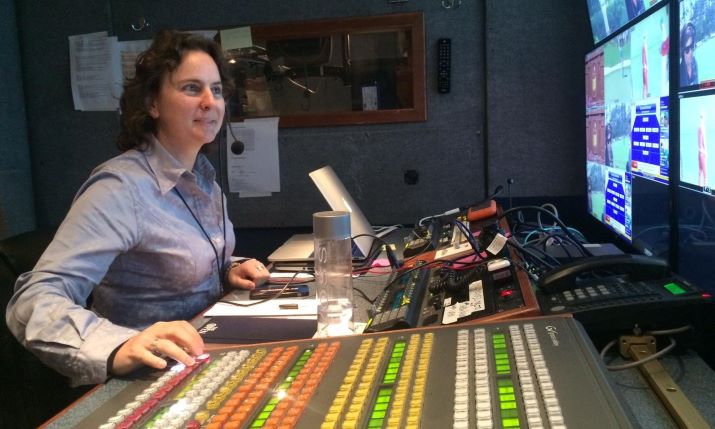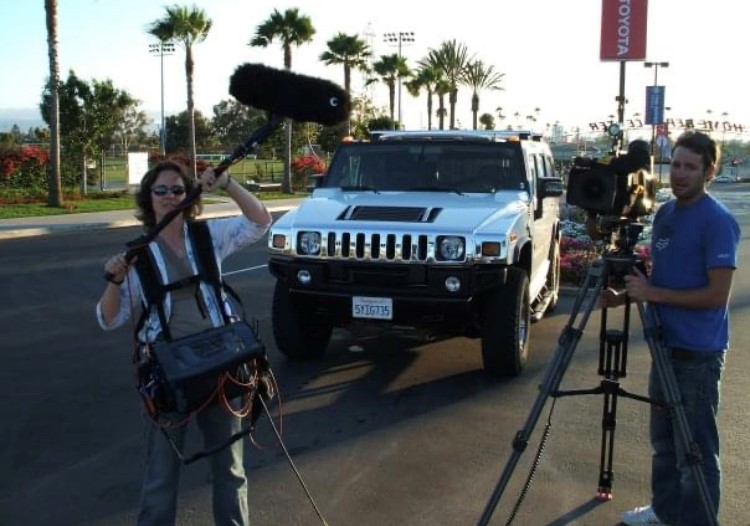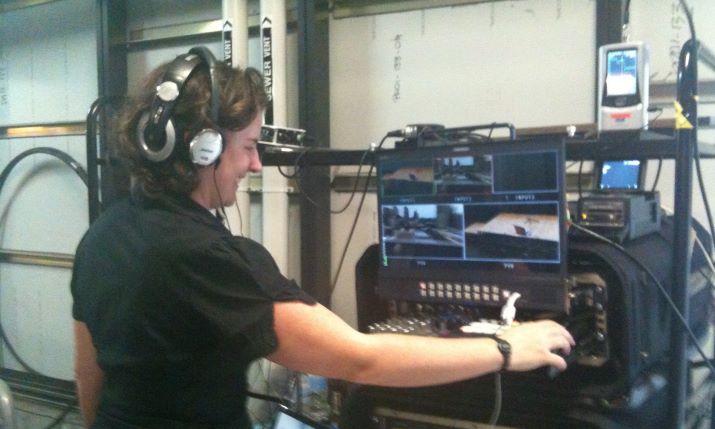From runner to production manager: Sky Sports News’ Victoria Rudling talks planning and creativity

Sky Sports News production manager, Victoria Rudling
Sky Sports News has kept going throughout the 2020 lockdown thanks to the hard work of a great team of people of which production manager Victoria Rudling is one.
Rudling’s year has gone from working on location at the Cheltenham Gold Cup to helping to keep Sky Sports News reporters online through the use of her wealth of skills picked up over the course of her career, and back to covering Royal Ascot as lockdown eased.
On how she first found out about TV broadcasting as a career, Rudling explains her inspiration. “At a school career open evening, I was handed a leaflet about broadcasting and was encouraged to do a nature documentary to fulfil that passion. My careers teacher actually laughed at this idea as a career for me and said I could be a secretary at the BBC, but would struggle as I am dyslexic.
“However, I had some great teachers who helped me get the grades to go to college for Media Studies,” she continues. “I saved up and brought my own video camera (kids today have no idea how lucky they are having one in a phone!) and then some friends and me made short films and documentaries. These won a few awards at festivals.”
Evolving creative goals
Her media studies course was progressive, so she was teamed with the local arts council, giving Rudling the opportunity to direct a short film under the mentorship of David Yates (director, latter four Harry Potter films).
Rudling comments: “The experience taught me so much. It reaffirmed that this is what I wanted to do; being part of a crew that is all pulling together in different roles for the same creative goal.
“From this path I managed to get into film school, as it was now my career goal to work in the film industry. But film school isn’t free, so to pay for that a friend who worked at Sky got me into Sky News as a runner. The rest, they say, is history!”
“The best bit about my role is seeing something you have planned come off the pages and become a production that runs smoothly”
Running is a great way to start in this business, notes Rudling. She says the experience meant she was able to see all the different roles that went into creating a piece of live TV. She adds: “The runners ‘How to’ guide in Sky News started with the lines, “leave your self respect at the door and wear your thickest of skins”, advice that has served me well over the years. After leaving Sky for a brief period to complete my studies, I returned as a runner but this time at its new channel, SkySports.ComTV, that then became Sky Sports News. I tried many different roles as a runner from lines ingest, cutting LVO and helping vision mix on the overnights.”
Then one evening she says, “Andy Cairns [former Sky Sports News executive editor, now retired] caught me in the corridors and asked, “why are you still running?”.”
“Andy was the head of the sports desk when I worked at Sky News, and [at that point] he headed up Sky Sports News,” Rudling goes on. “He very kindly put me forward to a new job that had opened up, marched me to Darren Long’s [then director of Sports operations, now group content processing director, Sky] office, and said here is your new sound recordist. I had done soundie work at film school but it wasn’t the direction I intended to pursue, preferring instead to go into film. I said I would do it for six months… I am now in my twentieth year as a staff member at Sky. Darren and Andy have been massively influential in my career at Sky and have given me amazing opportunities.”

Sky Sports News’ Victoria Rudling working on location in Los Angeles, covering David Beckham signing for LA Galaxy
Global achievements
Rudling carried on working at Sky Sports News for years as a sound recordist, travelling the globe covering large events. She gradually started getting involved in more of the planning of the coverage for these events, eventually being offered the role of production manager for Sky Sports News.
She adds: “I truly learned on the job, working with all the departments within Sky.”
“Planning for mainly non-rights holder events for Sky Sports News, from World Cups to Olympics, I enjoy the challenges of putting an event together no matter how small the crew was; often the most enjoyable were just me, the reporter, and a camera person. Going to Equatorial Guinea for the African Cup was one of the trips with just three of us covering the stories; it was during the Ebola Crisis, but I was privileged enough to visit a place one would never think to go.”
She continues: “The 2012 London Olympics was the biggest thing Sky Sports News had done [at the time]. We built a full studio on top of the Westfield Shopping Centre. To overlook the park we remoted the entire studio there, but left the gallery back at what was then our newly built Sky Studios. You never knew what you might encounter [when building the studio on top of Westfield]; deciding where the drains would go for the toilets is still up there as one of my top strange days at work, and I have had quite a few!”
She adds: “Running a kilometre of fibre in Rio for the 2004 World Cup to reach the fibre connection from our studio base with our local fixers dressed incognito as council workers to run it along the telephone poles was a fond memory. The locals were so very happy as they mistakenly thought they were getting better internet! Sorry to say we could not help them with that.”
What she enjoys most about her role is seeing a plan become a smooth running production. Rudling explains: “The best bit about my role is seeing something you have planned come off the pages and become a production that runs smoothly, both technically and from a health and safety standard. As a production manager, being able to turn your hand to most things helps, from grabbing food and drink, [to being] Hostile Environment First Aid Training(HEFAT) trained, and coming from a sound background means I can help with some technical issues; I have learned to edit as well to help my role and the team in the field. I enjoy the diversity that comes with my role as a production manager for Sky Sports News.
“The hit list to get it right for a happy crew is: food, parking, toilets, internet. Then I know we’ve got it all right [to be able to] put on a great production,” she adds.
Lockdown multitasking
During lockdown, Rudling was able to use her multitude of skills to be able to keep working. Before the government lockdown began Sky had already initiated work remotely. When the countrywide lockdown kicked in, Rudling was working on the Cheltenham Gold Cup, while watching her formerly busy year disappear as major sporting events were postponed.
She says: “Cheltenham Racing carried on and was the last big sporting event to happen. We made the decision to stay on site for the event as COVID was now a huge breaking story, however as the production manager. I am responsible for the health and safety of the crew. They were happy to stay on site but we changed our operating procedures in order to minimise the risk to and from the public. I made sure we stayed mainly in the media centre, stocked up on hand sanitiser and PPE, and brought in breakfast every morning for the team to maintain separation from others.
“After initiating that process, I went straight into a disaster recovery plan for Sky Sports News in case we had to shut Sky Studios for a short amount of time,” continues Rudling. “We put our match zone studio, a truck and a plan together, to keep Sky Sports News and other sports shows on air no matter what, should we need it; thankfully, we didn’t.”
Having some technical skills meant Rudling could stay busy assisting others, despite the lack of sport to cover. “From [that point onwards] I was helping all the reporters and presenters work from home remotely,” she says.
She goes on: “Preparing remote production kits to send to people’s houses ensured that we looked a bit better on the telly. We guided presenters through the set up process and I fielded frantic calls when something went wrong. Sky quickly pivoted and started using a system called Vmix. My team and I got up to speed on the technology to roll this out not only across Sky but also to NBC Universal (our parent company). We are still successfully doing shows in this format and widening it more and more, adding Zoom calls and cameras and a live element for reporters as they move out into the field.”
Rudling is still using Vmix and is still based mainly at home. “My role has been very similar to what is was during full lockdown as we are doing more shows on Vmix and we continue to limit time in the office to maintain social distancing. I continue to help plan and manage shows that are more physically spread out than they would normally be.”
Yet she has been back in the field occasionally, helping to fight fires and make sure horse racing stays on track and on air. She explains: “I have been back out in the field locally, on site at Royal Ascot and Champion days assisting Sky Racing Channel with a remote studio and nine live feeds back to Sky.
“With Sky Racing having the first race [back after the lockdown] exclusively and Her Majesty not able to physically attend the race for the first time ever, I am sure we had some high profile audience watching, so that was not an ideal time for the first mile of fibre to fall over! Luckily, we were backed up via Mobile View (a cellular bonded device). We quickly switched to these and hopefully no one was the wiser.
“However, that is why you have production manager’s on site in person, for when things don’t quite go as planned,” she says. “We had to rely on the SIMs to get the signal back as the internet went down as well, so I was very grateful that this time there weren’t 4,000 fans at the event using up all the signal strength. Not having any spectators does have some other benefits; you can generally move around easier, there’s no need to rush and strike the kit all at once and quickly get out of the carpark at the end of the day to avoid the queues, which was a nice bonus.”
She adds: “Before COVID, I still travelled a lot as a production manager,” says Rudling. “I look forward to a time we can do that again as I really enjoy the elements of setting up in remote locations and all that, adventure it brings.”

Victoria Rudling says: “My advice to anyone who wants to get into broadcasting is to talk people who work in the industry and shadow people as much as possible.”
Role models and running
Being a woman in sports news, Rudling says the environment at Sky, although male dominated, has always felt comfortable, and the industry is continuously evolving. She explains: “As I progressed in my role, I was always one of very few women in the crew. We only have one regular female camera person and as a soundie myself, working very closely with the camera team, it is always often crewed with all guys. It never really bothered me though; it was like having a lot of brothers and I always have felt one of the team, and I still do. I have also been lucky at Sky as other women have always been my direct managers, so I have had a strong leadership example to look up to in this environment as well.
“Of course, working in the field and often being one of the only women on the team, I’ve heard some casual sexist remarks here and there (only once has it ever been directed toward me that I can recall),” she notes. “The less than tasteful comments heard were mainly during my earlier time as a sound recordist, but over the years and as I’ve become a production manger, workplace cultures has changed. The world is changing for the better in that sense.
“For the London Olympics I was pleased to see so many of the team were women, and it just happened organically to make it so,” Rudling adds. “It showed me that we women at Sky and in the industry as a whole have become more of the normal fabric. This keeps me positively hopeful.”
For other women looking to move into a role in sports broadcasting, Rudling says: “My advice to anyone who wants to get into broadcasting is to talk people who work in the industry and shadow people as much as possible. If you do then think of them as mentors, ask questions and show an interest, and always get the teas and coffees! No matter what role I play in TV production, my runner roots have always served me well.
“There is so much learning you can do online, such as videos showing behind the scenes of TV production, but the goal is also to have an understanding about all the roles and the people in TV, which will make you stand out in an interview. I would say you don’t have to like sport to work in it, but it does help to have an interest in what you are putting on screen,” she concludes.
